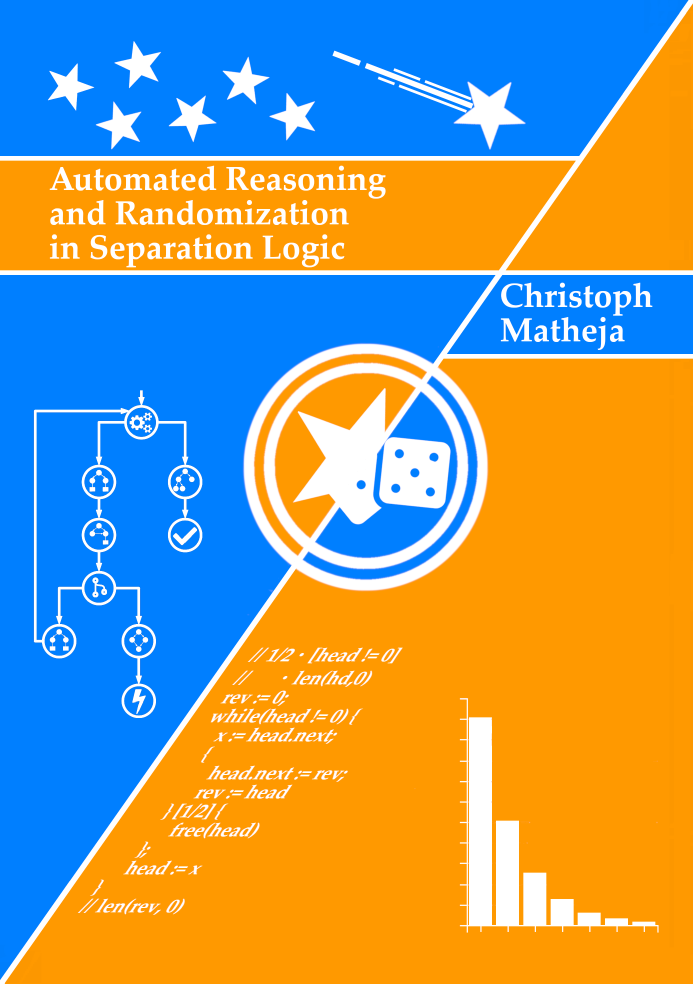
- matheja at cs.rwth-aachen.de
- Address
- Room 4206
Ahornstraße 55
D-52074 Aachen - Phone
- +49 241 80 21210
I am now working as a postdoc in the Programming Methodology Group at ETH Zürich. My new website is found here or, more generally, at cmath.eu.
Before moving to Zürich, I finished my PhD at the Software Modeling and Verification Group (MOVES) headed by Professor J.-P. Katoen in January 2020.
Thesis
My PhD thesis titled “Automated Reasoning and Randomization in Separation Logic” features
- a thorough introduction to weakest precondition reasoning about recursive and heap manipulating programs with separation logic,
- a novel quantitative separation logic for reasoning about expected values of probabilistic pointer programs, and
- automated reasoning with separation logic about temporal properties of pointer programs as well as decision procedures for reasoning about separation logic itself.
Research
My research interests include
- formal verification of heap-manipulating and probabilistic programs,
- graph grammars and graph transformations, and
- static program analysis.
Tools
- Attestor: A tool for model-checking Java pointer programs
- HARRSH: A robustness checker for symbolic heap separation logic with inductive definitions based on heap automata
Supervision
Together with Benjamin Kaminski, I supervised our student research assistant Kevin Batz. Moreover, together with Christina Jansen, I supervised our student research assistant Hannah Arndt.
I am currently supervising the following thesis projects:
- Sally Chau, TBA, Master’s thesis.
- Justus Fesefeldt, TBA, Master’s thesis.
- Philipp Schroer, Understanding Abstraction of Probabilistic Programs, Bachelor’s thesis.
- Johannes Schulze, TBA, Master’s thesis.
I have been supervising the following thesis projects and internships:
- Hannah Arndt, Randomized Meldable Heaps: A more formal proof of a less simple probabilistic data structure, Master’s thesis, 2019.
- Kevin Batz, TBA, Master’s thesis (together with Benjamin Kaminski and Sebastian Junges), 2019.
- Fabian Schneider, A Unified Algebraic Domain for Shape Analysis, Master’s thesis, 2018.
- Felix Bier, From Graph Grammars to Forest Automata and Back, Master’s thesis, 2018.
- Joshua Peignier (ENS Rennes), Possibility Distribution Semantics for Probabilistic Programs with Nondeterminism, internship, 2017 (together with Benjamin Kaminski).
- Daniel Cloerkes, A Cyclic Proof System for Graph Grammar Inclusion, Bachelor’s thesis, 2017.
- Kevin Batz, Proof Rules for Expected Run-Times of Probabilistic Programs, Bachelor’s thesis, 2017 (together with Benjamin Kaminski).
- Isabelle Tülleners, Graph-based Heap Abstraction for Balanced Data Structures, Bachelor’s thesis 2016.
- Hanna Franzen, Graph-based Symbolic Execution for Pointer Programs with Data, Bachelor thesis 2016.
- Hannah Arndt, Heap Abstraction Beyond Context-Freeness, Bachelor thesis, 2016.
- Victor Lanvin (ENS Cachan), Comparing Automated Tools for Analysing Pointer Programs, internship. 2016 (together with Christina Jansen).
Awards
Our paper How long, O Bayesian network, will I sample thee? A program analysis perspective on expected sampling times (joint work with Kevin Batz, Benjamin Kaminski, and Joost-Pieter Katoen) was nominated for the EATCS Best Paper Award at ETAPS 2018.
Our paper Rule-based Conditioning of Probabilistic Data Integration (joint work with Maurice van Keulen, Benjamin Lucien Kaminski, and Joost-Pieter Katoen) won the best paper award at SUM 2018.
Our paper Weakest Precondition Reasoning for Expected Run-Times of Probabilistic Programs (joint work with Benjamin Kaminski, Joost-Pieter Katoen, and Federico Olmedo) won the EATCS Best Paper Award for the best theory paper presented at ETAPS 2016.
I was awarded the Springorum Medal in 2015 for receiving a master’s degree with distinction.
Teaching
I’m currently involved in the following teaching activities:
Past teaching activities:
- Static Methods for Quantitative Program Analysis (Seminar) (WS 18/19)
- Static Program Analysis (SS 18)
- Formal Verification Meets Machine Learning (Seminar) (SS 18)
- Semantics and Verification of Software (WS 17/18)
- Foundations of Probabilistic Programming (Seminar) (WS 17/18)
- Compiler Construction (SS 17)
- Probabilistic Programming (WS 16/17)
- Static Program Analysis (WS 16/17)
- Analysis and Verification of Pointer Programs (Seminar) (WS 16/17)
- Compiler Construction (SS 16)
- Probabilistic Programming (Seminar) (SS 16)
- Theoretical Foundations of Programming Languages (Seminar) (SS 16)
- Concurrency Theory (WS 15/16)
- Algorithms and Data Structures (Proseminar) (WS 15/16)
- Semantics and Verification of Software (SS15)
- Principles of Programming Languages (Seminar) (SS15)
- Turing Award Topics (Proseminar) (WS 14/15)
| 2020 | |
|---|---|

 [bibtex]
[issue]
[bibtex]
[issue]
|
Christoph Matheja. Automated reasoning and randomization in separation logic, PhD Thesis, RWTH Aachen University, 1 Online-Ressource (x, 504 Seiten) : Illustrationen, Diagramme, 2020. |

|
Kevin Batz, Sebastian Junges, Benjamin Lucien Kaminski, Joost-Pieter Katoen, Christoph Matheja, Philipp Schroer. PrIC3: Property Directed Reachability for MDPs, 2020. https://arxiv.org/abs/2004.14835 |

|
Kevin Batz, , Joost-Pieter Katoen, Christoph Matheja. Relatively Complete Verification of Probabilistic Programs, 49 Seiten, 2020. https://arxiv.org/abs/2010.14548 |

 [bibtex]
[issue]
[bibtex]
[issue]
|
Kevin Batz, Sebastian Junges, Benjamin Lucien Kaminski, Joost-Pieter Katoen, Christoph Matheja, Philipp Schröer. PrIC3: Property Directed Reachability for MDPs, 32. International Conference on Computer Aided Verification (CAV 2020), Volume 12225 of LNCS, 512-538, Springer, 2020. |
 [bibtex]
[issue]
[bibtex]
[issue]
|
Benjamin Lucien Kaminski, Joost-Pieter Katoen, Christoph Matheja. Verifying Probabilistic Programs, 17. International Conference on Quantitative Evaluation of SysTems (QEST 2020), Volume 12289 of LNCS, 298-298, Springer, 2020. |
| 2019 | |
 [bibtex]
[issue]
[bibtex]
[issue]
|
Benjamin Lucien Kaminski, Joost-Pieter Katoen, Christoph Matheja. On the hardness of analyzing probabilistic programs, Acta informatica 56 (3), pages 255-285, Springer, 2019. |

 [bibtex]
[issue]
[bibtex]
[issue]
|
Kevin Batz, Benjamin Lucien Kaminski, Joost-Pieter Katoen, Christoph Matheja, Thomas Noll. Quantitative separation logic: a logic for reasoning about probabilistic pointer programs, Proceedings of the ACM on programming languages 3 (POPL), pages 34, ACM, 2019. |
| 2018 | |
 [bibtex]
[issue]
[bibtex]
[issue]
|
Hannah Arndt, Christina Jansen, Christoph Matheja, Thomas Noll. Graph-Based Shape Analysis Beyond Context-Freeness, 16. International Conference on Software Engineering and Formal Methods (SEFM 2018), Volume 10886 of LNCS, 271-286, Springer, 2018. |

 [bibtex]
[issue]
[bibtex]
[issue]
|
Kevin Batz, Benjamin Lucien Kaminski, Joost-Pieter Katoen, Christoph Matheja. How long, O Bayesian network, will I sample thee?: A program analysis perspective on expected sampling times, 27. European Symposium on Programming (ESOP 2018), Volume 10801 of LNCS, 186-213, Springer, 2018. |

|
Kevin Batz, Benjamin Lucien Kaminski, Joost-Pieter Katoen, Christoph Matheja, Thomas Noll. Quantitative Separation Logic: A Logic for Reasoning about Probabilistic Programs, 159 Seiten, 2018. https://arxiv.org/abs/1802.10467 |
 [bibtex]
[issue]
[bibtex]
[issue]
|
Hannah Arndt, Christina Jansen, Joost-Pieter Katoen, Christoph Matheja, Thomas Noll. Let this Graph Be Your Witness!: An Attestor for Verifying Java Pointer Programs, 30. International Conference on Computer Aided Verification (CAV 2018), Volume 10982 of LNCS, 3-11, Springer, 2018. |
 [bibtex]
[issue]
[bibtex]
[issue]
|
Benjamin Lucien Kaminski, Joost-Pieter Katoen, Christoph Matheja, . Weakest Precondition Reasoning for Expected Runtimes of Randomized Algorithms, Journal of the ACM 65 (5), pages 30:1-30:68, 2018. |
 [bibtex]
[issue]
[bibtex]
[issue]
|
Maurice van Keulen, Benjamin Lucien Kaminski, Christoph Matheja, Joost-Pieter Katoen. Rule-Based Conditioning of Probabilistic Data, 12. International Conference on Scalable Uncertainty Management (SUM 2018), Volume 11142 of Lecture Notes in Artificial Intelligence, 290-305, Springer, 2018. |
 [bibtex]
[issue]
[bibtex]
[issue]
|
, Christoph Matheja, Thomas Noll, . Harrsh: A Tool for Unied Reasoning about Symbolic-Heap Separation Logic, 13. International Workshop on the Implementation of Logics (IWIL 2018), Volume 57 of EPiC series in computing, 23-36, EasyChair, 2018. |
| 2017 | |
 [bibtex]
[issue]
[bibtex]
[issue]
|
Christina Jansen, Jens Katelaan, Christoph Matheja, Thomas Noll, Florian Zuleger. Unified Reasoning about Robustness Properties of Symbolic-Heap Separation Logic, 26. European Symposium on Programming (ESOP 2017), Volume 10201 of LNCS, 611-638, Springer, 2017. |

|
Hannah Arndt, Christina Jansen, Christoph Matheja, Thomas Noll. Heap Abstraction Beyond Context-Freeness, 44 Seiten, 2017. https://arxiv.org/abs/1705.03754 |
| 2016 | |
 [bibtex]
[issue]
[bibtex]
[issue]
|
Federico Olmedo Beron, Benjamin Lucien Kaminski, Joost-Pieter Katoen, Christoph Matheja. Reasoning about Recursive Probabilistic Programs, 31. Annual ACM/IEEE Symposium, 672-681, ACM Press, 2016. |
 [bibtex]
[issue]
[bibtex]
[issue]
|
Benjamin Lucien Kaminski, Joost-Pieter Katoen, Christoph Matheja. Inferring Covariances for Probabilistic Programs, 13. International Conference on Quantitative Evaluation of Systems (QEST 2016), Volume 9826 of LNCS, 191-206, Springer, 2016. |
 [bibtex]
[issue]
[bibtex]
[issue]
|
Benjamin Lucien Kaminski, Joost-Pieter Katoen, Christoph Matheja, Federico Olmedo Beron. Weakest Precondition Reasoning for Expected Run-Times of Probabilistic Programs, 25. European Symposium on Programming (ESOP 2016), Volume 9632 of LNCS, 364-389, Springer, 2016. |

|
Christina Jansen, , Christoph Matheja, Thomas Noll, . Unified Reasoning about Robustness Properties of Symbolic-Heap Separation Logic, 115 Seiten, 2016. https://arxiv.org/abs/1610.07041 |
| 2015 | |
 [bibtex]
[issue]
[bibtex]
[issue]
|
Christoph Matheja, Christina Jansen, Thomas Noll. Tree-Like Grammars and Separation Logic, 13. Asian Symposium on Programming Languages and Systems (APLAS 2015), Volume 9458 of LNCS, 90-108, Springer, 2015. |
| [bibtex] [issue] | Nils Jansen, Benjamin Lucien Kaminski, Joost-Pieter Katoen, Christoph Matheja, Federico Olmedo. Probabilistic Programs - A Natural Model for Approximate Computations, Workshop on Approximate Computing (AC15), 2015. |
